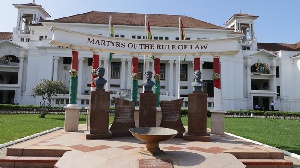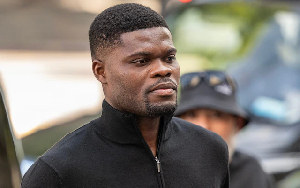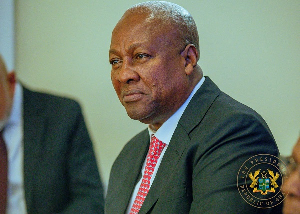The Election Petition before the Supreme Court of Ghana has been a major news item since late December 2020 when it was filed by petitioner John Dramani Mahama.
The petition was filed weeks after voters queued on December 7, 2020 to cast ballots in general elections. Mahama petitioned the court challenging the January 8 declaration by the Electoral Commission, EC, announcing Nana Addo Dankwa Akufo-Addo as winner of the presidential vote.
In this piece, GhanaWeb follows up an earlier write up that chronicled a busy January for parties in the case and the justices of the top court. This article looks at a busy February in the apex court.
Early February: Tale of two witnesses and a remote third
In early February, the Supreme Court saw witnesses of the petitioner mounting the dock to give evidence to back their case.
The National Democratic Congress’ General Secretary, Johnson Asiedu Nketia, whose testimony started in late January, continued. He stressed the party’s position that the EC’s declaration was misleading and incoherent. He was subjected to strict cross-examination by counsels for the respondents.
A major highlight of his time in the box was when he demanded a calculator to do computations whiles especially lawyer for second respondent sought to prove that his client had indeed surpassed the 50% plus one threshold contrary to the petitioners’ main claim that no candidate achieved the threshold.
Then came witness number two, Michael Kpessa-Whyte, who was one of two representatives of the petitioner at the national collation center known as the “strong room” located at the EC headquarters.
The high point of his evidence was a claim that he and the other representative, Robert Joseph Mettle-Nunoo had been instructed by the EC chair Jean Mensa to leave their post and for consultations with the petitioner.
He further claimed that Mrs Mensa sidelined their concerns and capitalized on their absence to make the December 9 declaration at a time they were going for the said consultation. Respondent lawyers cross-examined his claims vigorously.
Just when Kpessa-Whyte wrapped up his testimony, lead lawyer for the petitioner; Tsatsu Tsikata applied for the court to allow the petitioner file a third witness who was indisposed. That witness turned out to be Rojo Mettle-Nunoo.
The need to have him in the box was allied to testimony of the second witness. Mr.Kpessa-Whyte had affirmed that it was Rojo who directly spoke to the EC chair about leaving the strong room to consult Mahama.
Mettle-Nunoo, due to a health condition testified via video link in the presence of a judicial official. The major highlight from his two-day testimony was his interactions with the EC chair during his time in the strong room. Tea without biscuits trended when he disclosed the ‘hot water’ treatment he got.
On the 8th, when Rojo was done and the petitioner closed his case, lawyers for the respondents also moved to close their cases because they believed that the petitioner had not adduced enough evidence.
By closing their case, they had elected not to call any witnesses. Neither the EC chair nor the representative of second respondent will be testifying. That move triggered oral arguments, applications and counterarguments on case reopening and stay of proceedings in the weeks that followed.
Petitioner peeved by application dismissal galore
The petitioner made a number of applications to the bench, all of which were dismissed for lack of basis and or merit. The first in early February was an application for the inspection of the EC’s documents. The court dismissed it on the 3rd.
The petitioners’ second application was to allow him reopen his case on the 8th after it emerged the respondents were not going to present witnesses in the case. The court heard oral arguments on the reopening bid the following day and on the 11thunanimously dismissed the matter.
Whilesdelivering the ruling, CJ Kwasi Anin-Yeboah said: “we are not convinced and will not yield to the invitation being extended to the court by the counsel for the petitioner to order the respondents to enter the witness box in order to be cross-examined.”
"Accordingly, we hereby overrule the objection raised by the counsel for the petitioner against the decision of the respondents declining to adduce testimonies in this petition," the Chief Justice said.
Dissatisfied, the petitioner filed two formal applications on the 16th; the first was a motion of leave to reopen their case to allow them subpoena the EC chair and employ her as an adverse witness. The second was an application for a stay of proceedings pending the hearing of the review application.
The petitioner moved his arguments in the bid to reopen his case on the 15th, the application was dismissed on the 16th. The petitioners again filed a review of the dismissal on the 17th which move was dismissed yet again by a 9-member panel on the 20th.
Earlier on the 18th, the court had also dismissed a review application in the matter seeking the court to compel the EC chair to testify. The stay of proceedings application was separately heard on February 22 and was also dismissed.
Ayine’s predetermined comment and contempt purge
Dominic Ayine was in the news in January when the Chief Justice chided him over his demeanour during the sittings. In February, his problems were much bigger after he was cited for contempt.
Ayine, one of the spokespersons for the petitioner had, in a post-hearing press briefing on the 16th, stated that the bench seemed to have a predetermined agenda to rule against the petitioner.
“We have also said her exercise of discretion was contrary to Article 296 of the constitution. These are all germane issues under the constitution and laws of Ghana. To reduce the petition into a single issue petition is rather unfortunate and smack of a predetermined agenda to rule against the petitioner in this matter,” Ayine said in part.
The former Deputy Attorney General was docked on 22nd and ordered to purge himself of the contemptuous statement.
He subsequently told the media that he had regretted his pronouncements and had apologized via a letter to the Chief Justice and the justices of the apex court in writing, which letter he read publicly. On the 25th, the court purged him of the contempt charge.
Filing of final addresses and date for ruling announced
Lawyers for the petitioner on February 25 filed their closing addresses in the Election Petition following an order from the apex court. The court also slated March 4, 2021 as the date to deliver its ruling on the petition.
The closing addresses are the summary of all that have transpired in the course of the hearing and what each of the parties wanted as per their case before the court.
The Respondents, Electoral Commission and Nana Addo Dankwa Akufo-Addo had filed theirs on February 17, 2021. The petitioners had refused to file their addresses at the time because they had made an application for review of an application to reopen their case.
Judicial Service warns media over reportage
The media has been a crucial player since day 1 of the petition hearing. One of the earliest orders of the court was to allow a LIVE broadcast of the proceedings.
But as the case reached its final stages in late February, the Judicial Service through its lawyers (Sory @Law) wrote to the media cautioning them against some of their reports on the petition – specifically reports that opened the court and the justices up to public insults and threats.
“Our client’s concern arises from the publication and/or permitting the publication of a series of incendiary, hateful and offensive statements, and speeches on their various platforms against our client’s Justices,” point three of the 15-point February 25, 2021 statement read.
The Ghana Journalist Association, GJA; other press, civil society and human rights groups have, however, disagreed with the Judicial Service over the tone of their letter and particularly some of the demands they made relative to deletion of some categories of stories on the petition.
General News of Wednesday, 3 March 2021
Source: www.ghanaweb.com













